Morning Invocation
Sacred Reverent Chant Typically Recited Every Single dawn to awaken Lord Venkateswara.
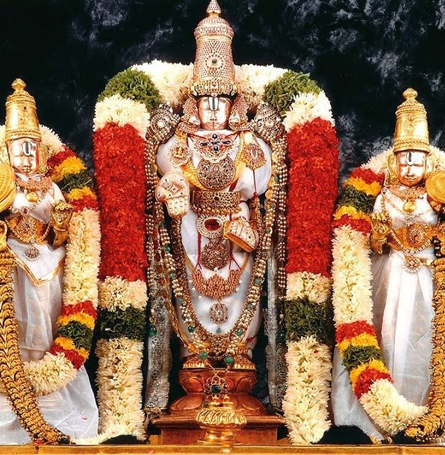
Sri Venkateswara Suprabhatam is a revered Sanskrit hymn recited to awaken Lord Venkateswara at the Tirumala Venkateswara Temple. Composed by Prativadi Bhayankara Annan in the 15th century, the hymn praises the deity and seeks his blessings. The Suprabhatam begins with an invocation to the divine consort, followed by verses glorifying Lord Venkateswara's divine attributes and qualities. It highlights the sacredness of the dawn and the significance of starting the day with devotion. The chant's melodic structure and elegance make it integral to daily rituals at the temple, drawing many devotees. Its recitation brings peace, prosperity, and spiritual upliftment. The Suprabhatam remains a cherished spiritual practice, reflecting the timeless connection between the divine and devotees.
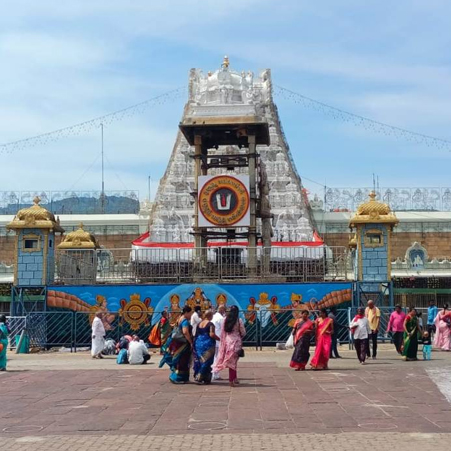
Sri Venkateswara Suprabhatam is a revered Sanskrit hymn with several themes, reflecting both individual and collective beliefs of devotees. The first section, named Suprabhatam, focuses on awakening Lord Venkateswara and greeting him at dawn. The second section praises the Lord, extolling his virtues and grandeur while praying for his success. The third section is supplication, where devotees seek the Lord's blessings and guidance. The fourth section is benediction, a ceremonial prayer seeking divine protection and grace from the deity. The Suprabhatam’s melodic structure and poetic elegance make it integral to daily rituals, drawing numerous devotees. Its recitation brings peace, prosperity, and spiritual upliftment, reflecting the timeless connection between the divine and devotees.
Named the first section, Suprabhatam, the entire prayer is also referred to by this title. It regards the Lord as a King-emperor, endowed with all the royal prerogatives and privileges of a ruler. Sri Venkatesa is equated with the incarnation of Rama. The opening verse, drawn from Valmiki's Ramayana, depicts Sage Viswamitra awakening the young Rama, urging him to uphold his noble lineage, and guiding him to commence his daily spiritual rituals at the break of dawn. This invocation highlights the deity's majestic and divine nature, resonating with the grandeur and reverence cherished by Lord Venkateswara's devotees, encapsulating his royal and divine essence.
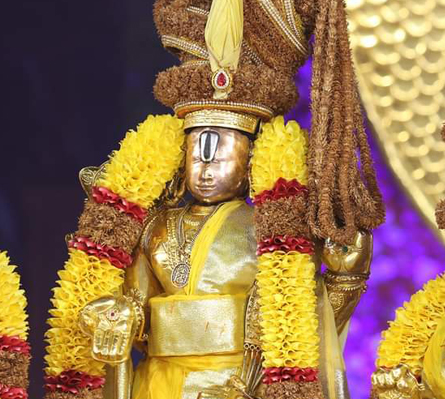
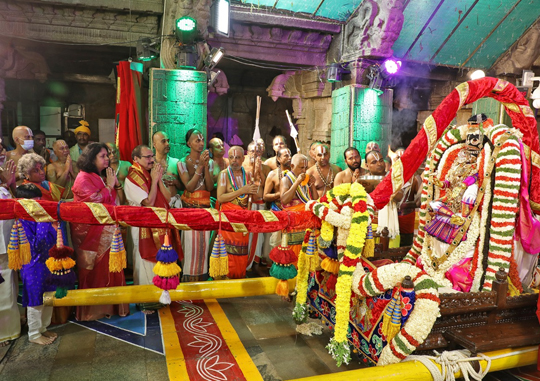
The second section is in praise of the Lord and prays for His success. He is seen as a great romantic, with Lakshmi as his permanent bosom companion. This section extols his virtues, celebrating his divine love and benevolence, and seeks his blessings for prosperity and protection.
The devotion expressed in these verses underscores the deep connection between the deity and his devotees, emphasizing the divine grace that flows from this eternal bond.
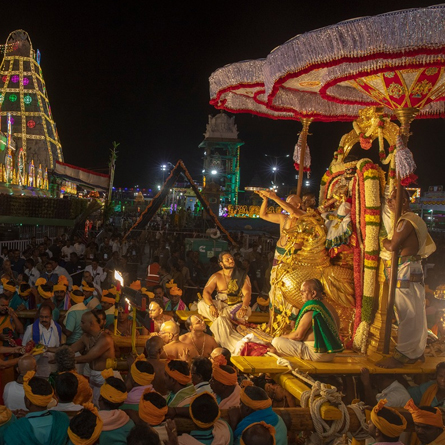
The third section is supplication, representing total and irreversible surrender. The devotee, overwhelmed by worldly concerns, faces numerous internal and external obstacles hindering spiritual growth. Seeking rescue, the devotee falls at the feet of the Lord and his consort. The distinctive marks on the Lord’s soles confirm his identity as Vishnu. This section highlights the devotee's plea for divine intervention and protection, emphasizing the Lord's role as the ultimate savior and source of spiritual strength.
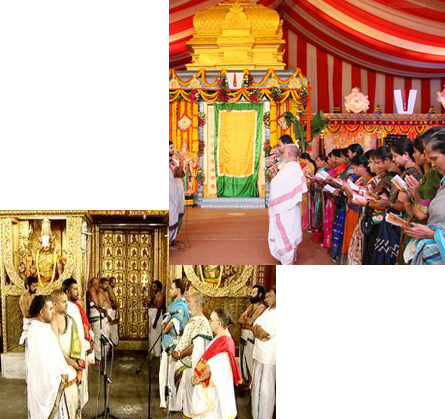
The fourth section is benediction, a ceremonial prayer seeking divine protection. Fearing potential harm, the author invokes divine intervention. The belief is that even the embodied Lord can be affected by the evil eye. The devotee seeks the aid of heavenly forces to ward off these negative influences.
Additionally, there is a belief in celestial beings who affirm every wish with "tathaa astu," meaning "may it be so." This section emphasizes the need for divine safeguarding and the power of celestial approval in ensuring the Lord’s and devotees' well-being.
| S.No. | Terms and Conditions | Details |
|---|---|---|
| 1 | Service Availability | 24*7 Days Service |
| 2 | Driver Bata | Rs. 500/- per day for Round Trip |
| 3 | Day Definition | 1 day means 1 Calendar day (midnight 12 to midnight 12) |
| 4 | Luggage Capacity | Sedan: 3 suitcases, SUV: 4 suitcases |
| 5 | Advance Notice | Inform one week in advance |
| 6 | Toll Fees and Charges | Extra; payable by passenger; can be included in the final bill |
| 7 | Driver Bata Charging Basis | Charged on a calendar day basis |
| 8 | Outstation Usage | Remaining kms not used in local Chennai; additional charges for local use beyond 1 hour |
| 9 | Service Tax and Other Taxes | Charged extra at applicable rates |
| 10 | Hill Area Conditions | AC may be switched off in hill areas to prevent engine overloading |
No, entry to the temple is free for all visitors.
Temple is open from 6:00 AM to 8:00 PM daily.
Yes, various rituals like Thomala Seva, Sahasranamarchana, and Abhishekam are conducted.
Yes, you can perform Nithyarchana or Sasvatha Nithyarchana for one or a lifetime.
Yes, the temple offers prasadam like Chakkara Pongali, Pulihora, and Pongal.
Photography might be restricted in certain areas of the temple premises.
Yes, there are lodging facilities available nearby for devotees.
The temple is located 12 km west of Tirupathi.
Yes, special pujas can be arranged for families upon prior request.
Yes, the temple premises are accessible, and assistance is available for those in need.

